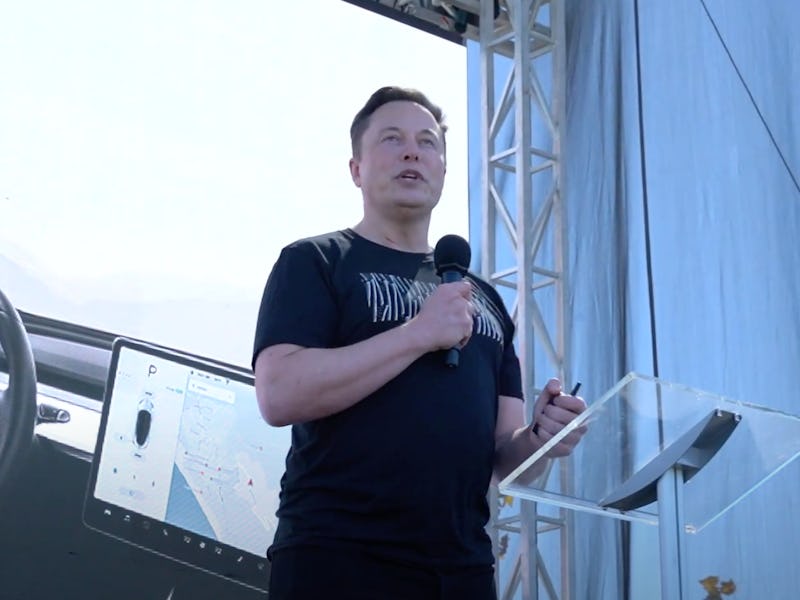Tesla’s cheapest-ever electric car: Elon Musk reveals price and launch plan
Tesla plans to release a new all-electric vehicle which promises to be cheaper than ever before. Here's what you need to know.

"We're confident that, long-term we can design and manufacture a compelling $25,000 vehicle," Tesla CEO Elon Musk told a socially-distanced gathering of fans in cars at the company's Fremont, California facilities on Tuesday.
Although shrouded in mystery – a presentation slide showed a cloth covering a car-shaped object – the announcement was one of the highlights from Tesla's long-anticipated Battery Day event.
The rest of the event was packed with impressive moments, like a new battery cell and an upgraded Tesla Model S. But it was the $25,000 car that tapped into one of Tesla's main goals.
"This has always been our dream from the beginning of the company," Musk said. "It was always our goal to try and make an affordable electric car."
"The rate of improvement of the affordability of cars is just not fast enough," Musk said, speaking alongside video clips of pollution-filled cities and statistics showing the runaway increase in global temperatures. Tesla's business focuses on zero-emissions electric vehicles, solar panels to generate electricity, and batteries to store clean energy.
At the event, Tesla unveiled a slew of advancements to its batteries, including a new cell design and shortened manufacturing process. In total, these improvements will equate to a 54 percent increase in battery range between charges, and a 56 percent reduction in price per kilowatt-hour, according to the company.
Tesla's $25,000 car.
Along with the battery developments, a $25,000 car is a major step toward making electric vehicles more accessible. Tesla first started selling the $108,000 Roadster in 2008, before releasing the Model S in 2012 with a starting price of $58,570. Tesla launched the Model 3 in 2017 with a price tag of $35,000, but it wouldn't actually start shipping that specific version until February 2019.
Musk has hinted at plans for a more economical vehicle before. In August 2018, he told YouTuber "MKBHD" that Tesla could launch a $25,000 car in three to four years. Shiv Patel, a research analyst with ABI Research, told Inverse in March 2019 that such a car would likely require a $5,000 battery, "which may be overly ambitious" over that timescale.
Musk has dropped other hints about Tesla's future vehicles, but it is unclear whether these refer to the same car. In January 2020, he said that a design center in China would create a future car for worldwide consumption. In the official announcement for the design center, Electrek reported the included concept art resembled an electric hatchback. And in July 2020, Musk told investors: "it would be reasonable to assume that we would make a compact vehicle of some kind."
With Tesla's new battery design, it may just be possible to achieve the battery prices required for such a car. Here's what to know about the $25,000 car.
Tesla $25,000 car: price and release date
The company is aiming to launch its new vehicle at a $25,000 price point. Based on the Model 3 rollout, this is likely to be the cheapest possible version of a Tesla car for some time to come. Tesla may also try to push consumers to buy more expensive vehicles: weeks after the firm started selling the $35,000 version of the Model 3, Tesla removed it from its website and relegated it to a phone order-only option.
When will it launch? Musk said that "about three years from now, we're confident" that Tesla could produce the $25,000 car. That would suggest the mystery car could hit roads in 2023 at the earliest.
Tesla $25,000 car: specifications and name
Little is known about the upcoming car, but we do have some tantalizing clues. Musk described the car as "fully autonomous," suggesting it would be able to drive passengers point-to-point with no human intervention. This isn't necessarily surprising: in October 2016, Tesla announced that every car it produced would ship with the necessary cameras and sensors to support fully autonomous driving.
The company is also developing computer upgrades and software improvements to enable the feature in future.
The exact battery range is also unknown. In July 2020, Musk wrote on Twitter that Tesla would not launch its planned entry-level Model Y compact SUV as "range would be unacceptably low." The limit, he claimed, was anything below 250 miles as rated by the Environmental Protection Agency. This suggests Tesla plans to stay above that figure for future vehicles as well.
During the Battery Day question-and-answer session, Musk also clarified "we don't have a name" for the new vehicle "yet." Now that Tesla's existing lineup spells out "S-3-X-Y," Musk may have to find a new word to spell out.
This article was originally published on